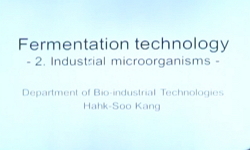에탄올 생산 세균 Zymomonas mobilis에서 에탄올 생산 경로의 핵심으로 작용하는 효소인, pyruvate decarboxylase (pdc) 유전자의 불활성 실험을 통해, PDC 활성이 50% 감소된 PDC 활성 변형균주가 분리되었...
http://chineseinput.net/에서 pinyin(병음)방식으로 중국어를 변환할 수 있습니다.
변환된 중국어를 복사하여 사용하시면 됩니다.
- 中文 을 입력하시려면 zhongwen을 입력하시고 space를누르시면됩니다.
- 北京 을 입력하시려면 beijing을 입력하시고 space를 누르시면 됩니다.
https://www.riss.kr/link?id=A101495437
- 저자
- 발행기관
- 학술지명
- 권호사항
-
발행연도
2015
-
작성언어
English
- 주제어
-
등재정보
KCI등재
-
자료형태
학술저널
- 발행기관 URL
-
수록면
1290-1297(8쪽)
-
KCI 피인용횟수
0
- DOI식별코드
- 제공처
-
0
상세조회 -
0
다운로드
부가정보
국문 초록 (Abstract)
에탄올 생산 세균 Zymomonas mobilis에서 에탄올 생산 경로의 핵심으로 작용하는 효소인, pyruvate decarboxylase (pdc) 유전자의 불활성 실험을 통해, PDC 활성이 50% 감소된 PDC 활성 변형균주가 분리되었다. 이러한 균주들의 에탄올 탄소대사 흐름이 고부가가치 화합물인 피루브산, 숙신산 및 젖산 등으로 전환되는지를 발효실험을 통해 평가하였다. 하지만 pdc의 발현을 중지시키기 위해 cat-삽입형-pdc와 pdc-결손형 아형 유전자를 전기 천공법을 이용해 야생형 균주 ZM4의 염색체에 이식하기 위한 다수의 시도에도 불구하고, 이러한 방법을 통해 분리된 균주들은 대부분 부분적 유전자 불활성 특성을 보였으며, PDC 활성이 완전히 손실된 삭제 돌연변이 균주를 획득할 수는 없었다. PDC활성이 변형된 돌연변이 균주의 발효 실험에서, 야생형 균주와 비교 시 감소된 PDC효소 활성의 변화로 인해 기질 흡수율과 에탄올 생산율이 감소되어 피루브산 생산이 약 2.5 g l-1 정도로 증가함을 확인하였으나, 젖산과 숙신산의 생산에 현저한 농도 변화를 보이지 못했다. 이러한 결과는 Z. mobilis의 산화환원 에너지가 PDC 효소 활성에 의한 에탄올 생산 경로에 전적으로 의존하여 발생한다는 것을 암시하였다. 상기 결과를 토대로 pdc 유전자의 완전한 불활성 유도와 산화환원 에너지의 균형은, 젖산 생산을 위한 lactate dehydrogenase, 숙신산 생산을 위한 pyruvate dehydrogenase와 malic enzyme과 같은 효소의 활성 증가를 통해, 세포내 NAD와 NADH 농도의 산화환원 균형이 이루어져야 발생할 수 있음을 시사하였다.
다국어 초록 (Multilingual Abstract)
Studies of the inactivation of a gene encoding pyruvate decarboxylase, pdc, in an ethanol-producing bacterium, Zymomonas mobilis, identified a mutant strain with 50% reduced PDC activity. To evaluate the possibility of a carbon-flux shift from an etha...
Studies of the inactivation of a gene encoding pyruvate decarboxylase, pdc, in an ethanol-producing bacterium, Zymomonas mobilis, identified a mutant strain with 50% reduced PDC activity. To evaluate the possibility of a carbon-flux shift from an ethanol pathway toward higher value fermentation products, including pyruvate, succinate, and lactate, fermentation studies were carried out. Despite attempts to silence pdc expression in the wild-type strain ZM4 using cat-inserted pdc and pdc-deleted homologs by electroporation, the strain isolated showed partial gene activation. Fermentation experiments with the PDC mutant strain showed that the reduced expression level of PDC activity resulted in decreased rates of substrate uptake and ethanol production, together with increased pyruvate accumulation of 2.5 g l-1, although lactate and succinate concentrations were not significantly enhanced in these modified strains. Despite numerous attempts, no strains were isolated in which complete pdc inactivation occurred. This result indicates that the ethanol fermentation pathway of this bacterium is totally dependent on the activity of the PDC enzyme. To ensure a redox balance of intracellular NAD and NADH levels, other enzymes, such as lactate dehydrogenase for lactate, and enzymes involved in the production of succinic acid, such as pyruvate dehydrogenase (PDH) and malic enzymes, may be needed for their increased end-product production.
목차 (Table of Contents)
- Introduction
- Materials and Methods
- Results
- Discussion
- References
- Introduction
- Materials and Methods
- Results
- Discussion
- References
- 초록
참고문헌 (Reference)
1 Rogers, P. L., "Zymomonas mobilis for fuel ethanol and higher value products" 108 : 263-288, 2007
2 Panesar, P. S., "Zymomonas mobilis : an alternative ethanol producer" 81 : 623-635, 2006
3 He, M. X., "Zymomonas mobilis : a novel platform for future biorefineries. Biotechnol" 7 : 101-, 2014
4 Weber, C., "Trends and challenges in the microbial production of lignocellulosic bioalcohol fuels" 87 : 1303-1315, 2010
5 Yang, S., "Transcriptomic and metabolomic profiling of Zymomonas mobilis during aerobic and anaerobic fermentations" 10 : 34-, 2009
6 Lee, K. Y., "The genome-scale metabolic network analysis of Zymomonas mobilis ZM4 explains physiological features and suggests ethanol and succinic acid production strategies" 9 : 94-, 2010
7 Seo, J. S., "The genome sequence of the ethanologenic bacterium Zymomonas mobilis ZM4" 23 : 63-68, 2005
8 Tsantili, I. C., "Quantifying the metabolic capabilities of engineered Zymomonas mobilis using linear programming analysis. Microb" 6 : 8-, 2007
9 Neale, A. D., "Pyruvate decarboxylase of Zymomonas mobilis : isolation, properties, and genetic expression in Escherichia coli" 169 : 1024-1028, 1987
10 Bringer-Meyer, S., "Pyruvate decarboxylase from Zymomonas mobilis. Isolation and partial characterization" 146 : 105-110, 1986
1 Rogers, P. L., "Zymomonas mobilis for fuel ethanol and higher value products" 108 : 263-288, 2007
2 Panesar, P. S., "Zymomonas mobilis : an alternative ethanol producer" 81 : 623-635, 2006
3 He, M. X., "Zymomonas mobilis : a novel platform for future biorefineries. Biotechnol" 7 : 101-, 2014
4 Weber, C., "Trends and challenges in the microbial production of lignocellulosic bioalcohol fuels" 87 : 1303-1315, 2010
5 Yang, S., "Transcriptomic and metabolomic profiling of Zymomonas mobilis during aerobic and anaerobic fermentations" 10 : 34-, 2009
6 Lee, K. Y., "The genome-scale metabolic network analysis of Zymomonas mobilis ZM4 explains physiological features and suggests ethanol and succinic acid production strategies" 9 : 94-, 2010
7 Seo, J. S., "The genome sequence of the ethanologenic bacterium Zymomonas mobilis ZM4" 23 : 63-68, 2005
8 Tsantili, I. C., "Quantifying the metabolic capabilities of engineered Zymomonas mobilis using linear programming analysis. Microb" 6 : 8-, 2007
9 Neale, A. D., "Pyruvate decarboxylase of Zymomonas mobilis : isolation, properties, and genetic expression in Escherichia coli" 169 : 1024-1028, 1987
10 Bringer-Meyer, S., "Pyruvate decarboxylase from Zymomonas mobilis. Isolation and partial characterization" 146 : 105-110, 1986
11 Jeon, Y. J., "Over-expression of xylulokinase in a xylose-metabolising recombinant strain of Zymomonas mobilis" 244 : 85-92, 2005
12 Sambrook, J., "Molecular cloning: a laboratory manual" Cold Spring Laboratory Press 1989
13 Goodman, A. E., "Minimal medium for isolation of auxotrophic Zymomonas mutants" 44 : 496-498, 1982
14 Smith, P. K., "Measurement of protein using bicinchoninic acid" 150 : 76-85, 1985
15 Kim, I. S., "Kinetic and nuclear magnetic resonance studies of xylose metabolism by recombinant Zymomonas mobilis ZM4(pZB5)" 66 : 186-193, 2000
16 Yang, S., "Improved genome annotation for Zymomonas mobilis" 27 : 893-894, 2009
17 Linger, J. G., "Heterologous expression and extracellular secretion of cellulolytic enzymes in Zymomonas mobilis" 76 : 6360-6369, 2010
18 Widiastuti, H., "Genome-scale modeling and in silico analysis of ethanologenic bacteria Zymomonas mobilis" 108 : 655-665, 2011
19 Schmitt, H. D, "Genetic analysis of the pyruvate decarboxylase reaction in yeast glycolysis" 151 : 1146-1152, 1982
20 Fuhrer, T., "Experimental identification and quantification of glucose metabolism in seven bacterial species" 187 : 1581-1590, 2005
21 Zhang, J, "Evolution by gene duplication: an update" 18 : 292-298, 2003
22 Rogers, P. L., "Ethanol production by Zymomonas mobilis" 23 : 37-84, 1982
23 Bubunenko, M., "Essentiality of ribosomal and transcription antitermination proteins analyzed by systematic gene replacement in Escherichia coli" 189 : 2844-2853, 2007
24 Kerr, A. L., "DNA restriction-modification systems in the ethanologen, Zymomonas mobilis ZM4" 89 : 761-769, 2011
25 Jeon, Y. J., "Comparative evaluations of cellulosic raw materials for second generation bioethanol production" 51 : 518-524, 2010
26 Lupski, J. R., "Chromosomal duplications in bacteria, fruit flies, and humans" 58 : 21-27, 1996
27 Johns, M. R., "Byproducts from Zymomonas mobilis" 44 : 97-121, 1991
28 Hannay, K., "Buffering by gene duplicates : an analysis of molecular correlates and evolutionary conservation" 9 : 609-, 2008
29 Shin, H. S., "Biotransformation of benzeldedyde to L-phenylacetylcarbinol, an intermediate in L-ephedrine production, by immobilized Candida utilis" 44 : 7-14, 1995
30 Aiba, S., "Biochemical Engineering" Academic Press 65-66, 1973
동일학술지(권/호) 다른 논문
-
Physicochemical Properties of Fish-meat Gels Prepared from Farmed-fish
- 한국생명과학회
- Hyung Kwang Kim(김형광)
- 2015
- KCI등재
-
Tyrosinase Inhibitory Activities of Meso-dihydroguaiaretic Acid from Machilus thunbergii
- 한국생명과학회
- Hyun Sook Kwon(권현숙)
- 2015
- KCI등재
-
- 한국생명과학회
- Kyoung-Tag Do(도경탁)
- 2015
- KCI등재
-
- 한국생명과학회
- 이지은(Ji Eun Lee)
- 2015
- KCI등재
분석정보
인용정보 인용지수 설명보기
학술지 이력
| 연월일 | 이력구분 | 이력상세 | 등재구분 |
|---|---|---|---|
| 2027 | 평가예정 | 재인증평가 신청대상 (재인증) | |
| 2021-01-01 | 평가 | 등재학술지 유지 (재인증) |  |
| 2018-01-01 | 평가 | 등재학술지 유지 (등재유지) |  |
| 2015-01-01 | 평가 | 등재학술지 유지 (등재유지) |  |
| 2011-08-03 | 학술지명변경 | 외국어명 : Korean Journal of Life Science -> Journal of Life Science |  |
| 2011-01-01 | 평가 | 등재학술지 유지 (등재유지) |  |
| 2009-01-01 | 평가 | 등재학술지 유지 (등재유지) |  |
| 2007-01-01 | 평가 | 등재학술지 유지 (등재유지) |  |
| 2004-01-01 | 평가 | 등재학술지 선정 (등재후보2차) |  |
| 2003-01-01 | 평가 | 등재후보 1차 PASS (등재후보1차) |  |
| 2001-07-01 | 평가 | 등재후보학술지 선정 (신규평가) |  |
학술지 인용정보
| 기준연도 | WOS-KCI 통합IF(2년) | KCIF(2년) | KCIF(3년) |
|---|---|---|---|
| 2016 | 0.37 | 0.37 | 0.42 |
| KCIF(4년) | KCIF(5년) | 중심성지수(3년) | 즉시성지수 |
| 0.43 | 0.43 | 0.774 | 0.09 |




 ScienceON
ScienceON DBpia
DBpia



